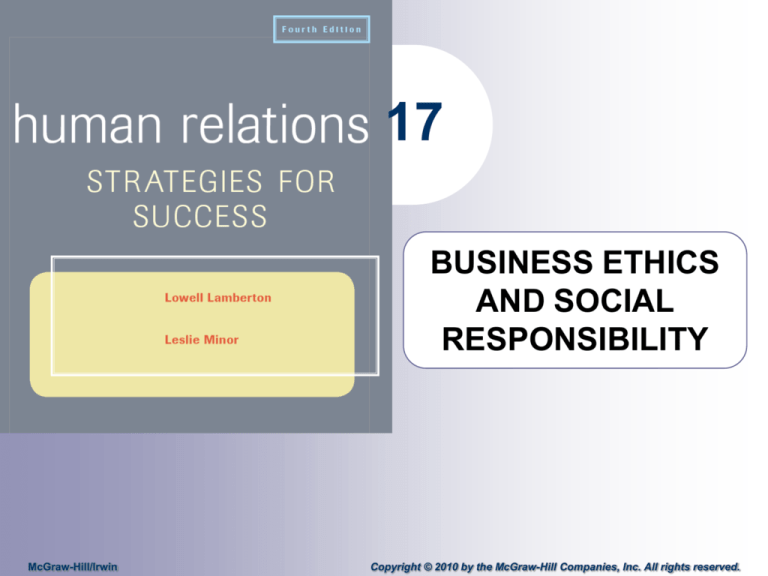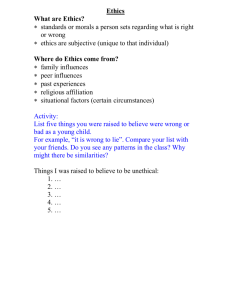
17
BUSINESS ETHICS
AND SOCIAL
RESPONSIBILITY
McGraw-Hill/Irwin
Copyright © 2010 by the McGraw-Hill Companies, Inc. All rights reserved.
Learning Objectives
Define ethics.
Explain the importance of a code of ethics.
Describe the process of rationalizing unethical
behavior.
Explain ethics in the context of the U.S.
workplace.
2
Learning Objectives
Describe the influence of group goals on
ethics.
Give examples of global ethics issues.
Define social responsibility.
Describe the process of whistleblowing.
3
What is Ethics
Ethics expresses the standards of right and
wrong.
Morality deals with how behavior should
conform to cultural ideals of right and wrong.
Morality represents broadly based, mostly
unwritten standards of behavior.
Ethics is more precise and is often based on
written guidelines.
4
What is Ethics
Ethical standards are different from law.
Ethics violations are not always punishable.
It is difficult to pin down ethics violations and
what the penalties for such violations should
be.
A common perception is ‗business‘ and
‗ethics‘ can hardly be used in the same
sentence.
5
What is Ethics
Misperceptions that affect understanding of
ethics:
–
–
All ethical problems have simple solutions in which
right and wrong are always obvious.
Ethics is simply a matter of complying with a set of
rules or regulations.
6
What is Ethics
Ethics and the Internet
–
–
–
–
A sticky ethical issue is how to behave ethically on
the Internet?
Companies track employee usage, looking for
personal misuse of company property.
The Internet has introduced enormous compliance
issues.
Online merchants purchase confidential
information about people‘s buying habits.
7
What is Ethics
Ethics and the Internet (cont.):
–
–
–
Consumers resent personal information being sold
without consent.
Due to technology, people don‘t know what the
ethics issues are.
Another issue is copyright infringement.
8
Codes of Ethics
Some companies have developed specific
ethical codes.
Codes of ethics are usually based on one of
the following ethical approaches:
–
–
–
–
–
Principles of justice
Individual rights
Utilitarianism
Individualism
The categorical imperative
9
Codes of Ethics
Principle of justice – All decisions should be
consistent, unbiased, and based on fact.
Principle of individual rights – All decisions
should respect basic human rights and the
dignity of the individual.
Principle of utilitarianism – All decisions
should do the greatest good for the largest
number of people.
10
Codes of Ethics
Principle of individualism – All primary goals
should achieve long-term self-interests.
Categorical imperative – A principle
developed by Immanuel Kant, which asks,
―What would the world—or my company—be
like if everyone were to do this?‖
11
Rationalizing Unethical
Behavior
Even people with a good knowledge of ethics
can rationalize unethical behavior.
People with high self-esteem are less likely to
seek the short-term gains of unethical
behavior and not engage in rationalization.
12
Rationalizing Unethical
Behavior
According to Saul Gellerman, unethical
behavior starts with one of these four
rationalizations:
–
–
–
–
Unethical behavior is within ethical/legal limits.
Because the chosen behavior will work best for the
individual/ company, the company would expect it.
Nobody will notice.
As the behavior helps the company, it will protect
the person if he/she is caught.
13
Ethics in Context
An ethical issue is people acting insincerely
with others to achieve their own ends.
Politics exists in any company; gaining
political power isn‘t an unethical behavior.
When people compromise on integrity to
succeed at getting ahead, it crosses an
ethical line.
A common view is that boss massaging is
necessary for success.
14
The Influence of Group Goals
When encountering someone in need of help,
many people look the other way as their goals
or group‘s pressures override the need to
help.
This creates conflict, as people are unable to
transfer helping behavior they learn at home
to the workplace.
Many people change their ethical standards
between home and work.
15
Global Ethics Issues
A historical perspective
–
–
–
The values and customs of other countries are not
inferior, primitive, or degraded.
They have different origins, evolutions, and
applications through history.
Discussion example: Acceptance of bribery and
kickbacks
16
Global Ethics Issues
Three concepts to remember while doing
business with foreign companies:
–
–
–
Inner circle – Clique of trusted family/tribal
members/friends who are at the center of power/
influence.
Future favors – Based upon mutual obligation, and
resulting in the exchange of favors; common in
developing countries and also used in some
industrialized countries.
Gift exchange – A strong tradition in many cultures
in which giving gifts create a future obligation to
the receiver.
17
Social Responsibility
Social responsibility means putting ethical
standards to work in all areas of the global
community in which one lives.
It includes acting ethically with customers, coworkers, suppliers, competitors, and the
community in which one lives.
18
Social Responsibility
Three accepted views of social responsibility:
–
–
–
Traditional social responsibility – An organization
is responsible only to itself and to making a profit.
Stakeholder social responsibility – Companies are
responsible to stakeholders.
Affirmative social responsibility – Companies are
also responsible to the general public at large.
19
Social Responsibility
Difficult questions regarding social
responsibility:
–
–
–
What happens when a company can no longer
afford to support charities or organizations?
How does a company choose to support specific
organizations while not helping others?
Companies may also find that their acts of social
responsibility are misunderstood and resented.
20
Blowing the Whistle
Whistleblowing
–
–
–
Turning in or otherwise exposing people who
behave unethically in a company.
The first law passed to protect whistleblowers was
the Lloyd–LaFollette Act of 1912.
The Whistleblower Protection Act was passed in
1989 and strengthened in 1994.
21
Blowing the Whistle
Strategies for a whistleblower:
–
–
–
Secretly threatening the offender with blowing the
whistle unless the unethical action is
stopped/corrected.
Anonymously blowing the whistle within the
company, keeping one‘s identity a secret.
Secretly threatening a responsible manager of
blowing the whistle outside the company unless a
change is made in the conduct.
22
Blowing the Whistle
Strategies for a whistleblower (cont.):
–
–
–
–
Sabotaging the results of an unethical behavior in
some way.
Publicly blowing the whistle within the
organization.
Quietly refusing to carry out an unethical plan.
Secretly or publicly blowing the whistle outside the
company.
23
Blowing the Whistle
Top management is in an ideal position to
create an ethical environment.
Management can create low ethical standards
by the following mistakes:
–
–
–
Favoritism.
―Fudging‖ with the expense budget.
Lying to or otherwise manipulating other
departments or offices within one‘s company.
24
Strategies for Success
Making ethical decisions: A quick ethics test
from Texas Instruments:
1.
2.
3.
4.
5.
6.
7.
Is it legal?
Is it consistent with the company‘s stated values?
If you do it, will you feel bad?
How would it look in the newspapers?
Do you think it‘s wrong?
If you‘re not sure—ask.
If you don‘t get a clear answer, keep asking until
you do.
25
Strategies for Success
Becoming culturally aware of ethical
conduct:
1.
2.
3.
Look closely at the situation.
Evaluate the intentions.
Explore your options.
26
Summary
Ethics expresses the standards of right and
wrong as accepted among a specific group of
people.
Codes of ethics provide the agreement and
documentation for a company‘s ethical
operation.
The major ethical codes are the principles of
justice, individual rights, utilitarianism, and
individualism.
Rationalization is the use of reasonablesounding excuses to explain unethical
conduct.
27
Summary
Social responsibility means putting ethical
standards to work in all areas of work and life.
Three common views on social responsibility
are traditional, stakeholder, and affirmative
social responsibility.
Whistleblowing involves exposing people who
behave unethically in the company.
28








